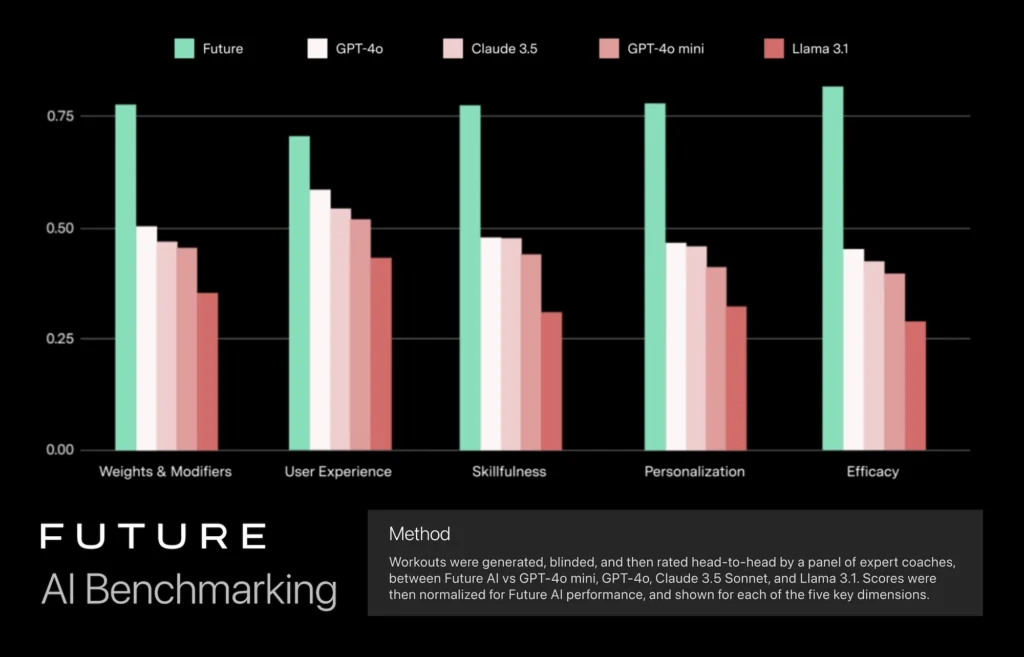
Future’s Assistant Coach tool uses AI to help personal trainers create workout plans and message clients in a fraction of the time
In case any personal trainers were worried that AI might be coming for their jobs, Future has other plans.
The digital personal training platform has released Assistant Coach, an artificial intelligence tool that helps fitness coaches create workout plans and send voice/text messages to their clients.
The idea behind Assistant Coach is to empower personal trainers, not replace them (hence the name), according to Future’s co-founder and CEO Rishi Mandal.
“Future’s AI actually promotes more thoughtful and meaningful human interactions,” Mandal told Athletech News. “It allows the coaches to focus on the human relationship and also scaffolds for it, suggesting workouts and insights to the trainer based on what workouts users have liked, personal interests, work, and travel plans, times of the day/week you’re most receptive, etc.”

The ‘Future’ of Personal Training
Created in 2017 by Mandal, a Google and NASA alum, and Justin Santamaria, a former Apple engineer, Future’s online platform connects users with real-life personal trainers who develop customized training plans and send voice/text messages to encourage workout adherence.
The company is investing heavily in AI, viewing it as the key to helping personal trainers scale so they can take on more clients.
Assistant Coach was trained on tens of millions of text conversations between personal trainers and their clients, and around one million custom workout programs.
As a result, Future’s AI engine significantly outperforms general-purpose AI models including OpenAI (GPT-4), Anthropic (Claude 3.5 Sonnet), and Meta (Llama 3.1) when it comes to creating effective and safe workout plans, the personal training company reports.
Mandal says that’s not surprising, since Assistant Coach was designed specifically for personal trainers. This specialization mirrors the way AI is being leveraged in other sectors.
“Large, general purpose models are great at some things, but are rarely used for high-value use cases,” Mandal noted. “For instance, you wouldn’t let ChatGPT drive your car for you. Instead, we tend to rely on models that are trained on real-world driving data to power-assisted cruise control or self-driving functions. Similarly, Assistant Coach includes specialized AI agents that are built to help interpret a member’s needs, bank a memory about a member, design custom training plans, etc.”

Future says it’s already incorporated Assistant Coach into the everyday workflow of hundreds of its coaches, speeding up their ability to generate workout plans and respond to questions from clients.
“The most exciting and profound implication of this technology is that it will help us bring coaching to many more consumers than could previously afford this kind of one-on-one expertise and accountability,” Mandal said.
Friend or Foe? How Different Brands Are Using AI
Future isn’t alone in working to create a “future” where AI helps personal trainers rather than replaces them.
CoachRx, a software platform for fitness coaches created by OPEX Fitness, released RxBot, an AI assistant that helps coaches generate training plans based on a client’s goals, physical assessment results, and available equipment.
“AI is going to help coaches spend less time on the more mundane aspects of their job and more time focusing on the client-coach relationship and the human element,” CoachRx’s chief technology officer Casey Jenks has told ATN. “It’s definitely not going to replace coaches.”
Other fit tech brands are taking a different approach, however.
Tempo, a home strength training brand, has made no secret about its mission of using AI to create “the world’s best personal training experience” – that is, one that’s cheaper and more effective than human coaching. Tempo’s product combines artificial intelligence with smart barbells and dumbbells to track form and suggest workout plans based on machine learning and biometric data.
Kabata, meanwhile, is planning to launch the world’s first AI-powered dumbbells, which track reps, analyze form, and change weight in real-time. Kabata’s system also provides workout plans and on-screen guidance.
While brands like Tempo and Kabata won’t spell the end of personal trainers anytime soon, their emergence suggests that the rise of AI isn’t all good news for personal trainers, especially those whose primary value-proposition lies in teaching their clients how to perform exercises.
